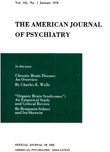The "Pink Spot," 3,4-Dimethoxyphenylethylamine, Common Tea, and Schizophrenia
Abstract
Several studies of schizophrenic and normal patients suggested a plant food dietary source for urinary 3, 4-DMPEA. The authors' study of three nonschizophrenics found this urinary amine (positively identified by mass spectrometry) present during free diet plus tea ingestion and not present during controlled diet except when tea was being ingested. They conclude that urinary 3, 4-DMPEA has an exogenous plant source and that its presence is not primarily related to schizophrenia.
Access content
To read the fulltext, please use one of the options below to sign in or purchase access.- Personal login
- Institutional Login
- Sign in via OpenAthens
- Register for access
-
Please login/register if you wish to pair your device and check access availability.
Not a subscriber?
PsychiatryOnline subscription options offer access to the DSM-5 library, books, journals, CME, and patient resources. This all-in-one virtual library provides psychiatrists and mental health professionals with key resources for diagnosis, treatment, research, and professional development.
Need more help? PsychiatryOnline Customer Service may be reached by emailing [email protected] or by calling 800-368-5777 (in the U.S.) or 703-907-7322 (outside the U.S.).



